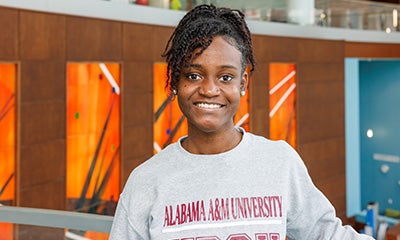Tuberculosis
For many students, a serious and extended illness can be a setback, but for J’Lah Dukes, it helped set the stage for her plans to become a pediatric nurse.
It doesn’t mean that getting tuberculosis at the age of 12 wasn’t difficult. J’Lah had a lot to overcome. “Since I had never caught anything worse than a cold, I wasn’t sure what to do,” she said.
The first hurdle was figuring out what was happening to her and getting a diagnosis. She started with night sweats and eventually developed a cough that was bad enough she would sometimes have to leave class to “cough it out” in the hallway. Her mother conferred with J’Lah’s godmother, and they thought perhaps she was just getting overheated. Then one night, while she was babysitting, J’Lah coughed up blood. Her mom took her to the emergency department, and she was transferred by ambulance to Children’s of Alabama because of the volume of blood she was coughing up. “That was my first time in an ambulance,” J’Lah said. “The person in the ambulance told me not to be scared, that I would be out of the hospital by 1:00 a.m. Let’s just say 1:00 a.m. turned into five days!”
She was isolated in a special room and given a skin test the second day. When that test came back positive, she began treatment.
And then she faced the second hurdle. Quarantined for five days in the hospital and two weeks at home, she felt isolated. All the students in her school had to be tested. “Everyone was freaking out and trying to figure out who had tuberculosis,” she says. She saw comments on social media such as “whoever has it better stay away from me.”
Her initial admittance to the hospital was scary and confusing, but the nurses helped her understand what was happening and feel better about herself. “The nurses would talk to me about my life and anything else to take my mind off the tuberculosis,” she said. “They made me feel OK and not guilty. I was sad when I left the hospital, because I had made friends with the nurses.”
The final hurdle was recovery. Once her quarantine was over, J’Lah returned to her extracurricular activities: choir and cheerleading. Both required deep breathing, and that wasn’t easy at first. “That has gotten better, but it was hard to take deep breaths at first, and harder to hold long breaths in choir,” she said.
She didn’t immediately decide to become a nurse. Like most young people, she had to think about her career. “It took a while to figure out what I wanted to do with my future. My mom always wanted me to be a nurse. I was settling on psychology. But then people would ask me about my experience in the hospital. I felt so comfortable there. The nurses didn’t make me feel like I was in the hospital or like having tuberculosis was bigger than me at such a young age.”
The closer J’Lah got to graduation, the more she felt the call to become a nurse. “My whole purpose in my career is to help people,” she said. Specifically, she hopes to be a pediatric travel nurse, starting in a hospital similar to Children’s.
She has been accepted at Alabama A&M University, and she speculates that she may transfer to the UAB School of Nursing later. “I went from a scared 7th grader who had never broken a bone to a senior in high school ready to become the ones who saved me,” she said. “I want to make children feel safe and cared for and like they’ll be OK—just how I felt.”











